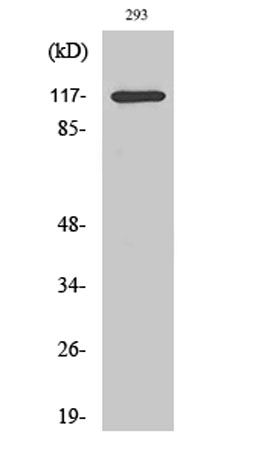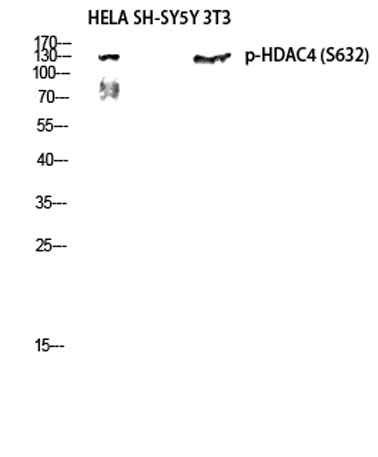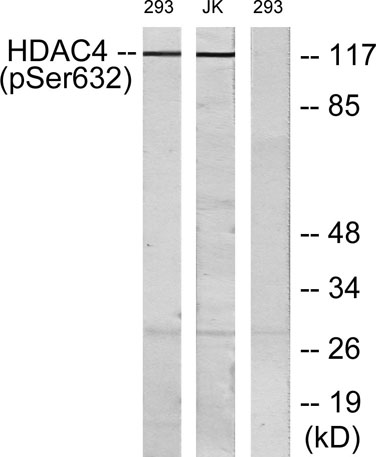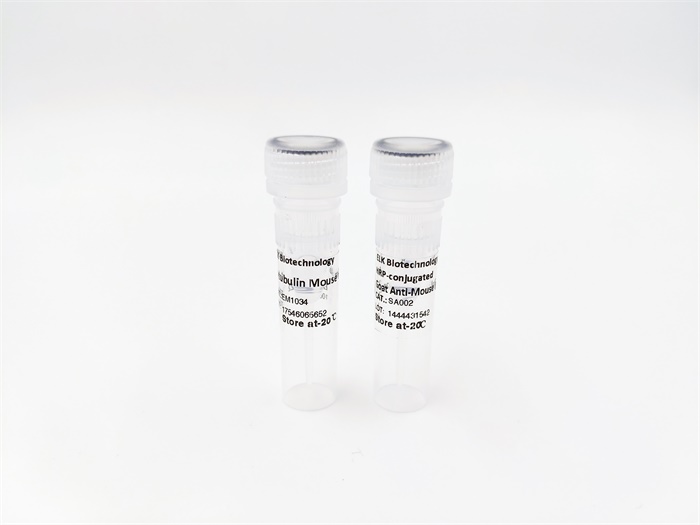








HDAC4 (phospho Ser632) rabbit pAb
 One-click to copy product information
One-click to copy product information$148.00/50µL $248.00/100µL
| 50 µL | $148.00 |
| 100 µL | $248.00 |
Overview
| Product name: | HDAC4 (phospho Ser632) rabbit pAb |
| Reactivity: | Human;Mouse;Rat |
| Alternative Names: | HDAC4; KIAA0288; Histone deacetylase 4; HD4 |
| Source: | Rabbit |
| Dilutions: | Western Blot: 1/500 - 1/2000. ELISA: 1/20000. Not yet tested in other applications. |
| Immunogen: | The antiserum was produced against synthesized peptide derived from human HDAC4 around the phosphorylation site of Ser632. AA range:598-647 |
| Storage: | -20°C/1 year |
| Clonality: | Polyclonal |
| Isotype: | IgG |
| Concentration: | 1 mg/ml |
| Observed Band: | 119kD |
| GeneID: | 9759 |
| Human Swiss-Prot No: | P56524 |
| Cellular localization: | Nucleus. Cytoplasm. Shuttles between the nucleus and the cytoplasm. Upon muscle cells differentiation, it accumulates in the nuclei of myotubes, suggesting a positive role of nuclear HDAC4 in muscle differentiation. The export to cytoplasm depends on the interaction with a 14-3-3 chaperone protein and is due to its phosphorylation at Ser-246, Ser-467 and Ser-632 by CaMK4 and SIK1. The nuclear localization probably depends on sumoylation. Interaction with SIK3 leads to HDAC4 retention in the cytoplasm (By similarity). . |
| Background: | Histones play a critical role in transcriptional regulation, cell cycle progression, and developmental events. Histone acetylation/deacetylation alters chromosome structure and affects transcription factor access to DNA. The protein encoded by this gene belongs to class II of the histone deacetylase/acuc/apha family. It possesses histone deacetylase activity and represses transcription when tethered to a promoter. This protein does not bind DNA directly, but through transcription factors MEF2C and MEF2D. It seems to interact in a multiprotein complex with RbAp48 and HDAC3. [provided by RefSeq, Jul 2008], |
-
 Western Blot analysis of various cells using Phospho-HDAC4 (S632) Polyclonal Antibody diluted at 1:1000
Western Blot analysis of various cells using Phospho-HDAC4 (S632) Polyclonal Antibody diluted at 1:1000 -
 Western blot analysis of HELA SH-SY5Y 3T3 lysis using Phospho-HDAC4 (S632) antibody. Antibody was diluted at 1:1000
Western blot analysis of HELA SH-SY5Y 3T3 lysis using Phospho-HDAC4 (S632) antibody. Antibody was diluted at 1:1000 -
 Western blot analysis of lysates from 293 cells treated with etoposide 25uM 1hour and Jurkat cells treated with etoposide 25uM 24hours, using HDAC4 (Phospho-Ser632) Antibody. The lane on the right is blocked with the phospho peptide.
Western blot analysis of lysates from 293 cells treated with etoposide 25uM 1hour and Jurkat cells treated with etoposide 25uM 24hours, using HDAC4 (Phospho-Ser632) Antibody. The lane on the right is blocked with the phospho peptide.

 Manual
Manual